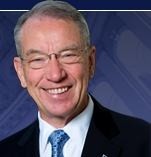Senators: HFCS is being ‘significantly mischaracterized’

In a letter to FDA commissioner Margaret Hamburg written by senator Charles Grassley (Rep - IA) and co-signed by senators Mike Johanns, Claire McCaskill, Dan Coats, Ben Nelson, Richard Lugar and Roy Blunt, Grassley argues that HFCS is being “significantly mischaracterized in the marketplace largely because of its name”.
HFCS creates US jobs
The version used in many foods (HFCS 42) is the lowest fructose-containing sweetener on the market, he adds, yet surveys consistently show consumers erroneously believe it contains more fructose than sugar.
Consumers were better able to understand the fructose level, calories and sweetness of HFCS when the term ' corn sugar' was used, claims Grassley, who also argues that HFCS “keeps foods affordable for American consumers and creates high-paying jobs here at home”.
HFCS is just sugar made from corn
His letter has been filed with other comments responding to the CRA petition in a public docket along with a request from senator Tom Harkin urging the FDA to consider allowing firms to co-label the sweetener on ingredients lists as ‘High fructose corn syrup (corn sugar)’.
The contents of the docket reveal how polarized opinion has become, with critics claiming the CRA is trying to deceive consumers and supporters claiming an alternate name would in fact boost consumer understanding by tackling misconceptions.
One supporter, New York –based dietician Jessica Fishman Levinson, writes: “People think HFCS is higher in calories and fructose and is sweeter than table sugar… In reality, HFCS and sucrose have the same number of calories, nearly the same amount of fructose and the same level of sweetness.
“It is time for a change to the name so that consumers can see that HFCS is actually just sugar made from corn.”
Marion Nestle: Name change not in public interest
However, several nutritional experts oppose the petition, including Marion Nestle, professor in the department of nutrition, food studies and public health at New York University.
She says: “The [CRA] website quotes comments I have made to the effect that HFCS is biochemically equivalent to sucrose. It is. But I do not believe biochemical equivalence is a good reason for the FDA to agree to a name change...
“The name change is not in the public interest. Its only purpose is to further the commercial interests of members of the Corn Refiners, and that is not one the FDA should be concerned about.”
But the CRA was quick to respond: “CRA members have the same interests as the broader food industry and consumers in promoting clear and accurate food labeling and in assuring that all ingredient producers are permitted to compete on a level playing field.”
Mintel survey: 4 percent of shoppers avoid HFCS
An April 2011 online survey of 2,000 consumers conducted by Mintel Research found that just 4 percent were looking to avoid HFCS when asked unprompted questions.
However, many food manufacturers continue to believe there is marketing capital to be made from avoiding it, with Datamonitor recently revealing that one in 50 new products launched in the US in 2010 featured the claim ‘no high fructose corn syrup’ (HFCS).
CRA: 'Compelling evidence' consumers are misled by HFCS name
The CRA’s petition - filed last September - asks the FDA to revise the generally recognized as safe (GRAS) affirmation regulation for HFCS to recognize ‘com sugar’ as an alternate name on the grounds there is “compelling evidence that many consumers are misled by the ingredient name”.
The CRA – which represents the corn refining industry in the US – claims the term ‘corn sugar’ would provide greater clarity for consumers, many of which are laboring under the misapprehension that HFCS is higher in calories, fructose, and sweetness than table sugar (sucrose).
However, the 'corn sugar' name is strongly opposed by sugar refiners and farmers, which recently filed a lawsuit against leading corn refiners in a bid to stop them using the new term in a TV ad campaign ahead of the FDA’s decision on the CRA petition.
Greater clarity for consumers?
HFCS 42, which is used in foods, contains about 42 percent fructose with the balance mostly comprising glucose. HFCS 55, which is used in soft drinks, contains 55 percent fructose with the balance made up mostly by glucose. Table sugar (sucrose) contains 50:50 glucose and fructose).
















